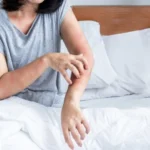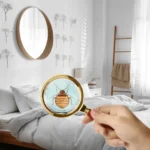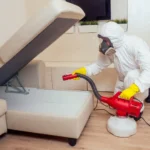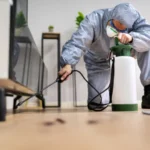Pest control is essential for maintaining a healthy and comfortable living environment. However, many homeowners often wonder about the safety of being around pest control treatments. This blog will explore the question, “Is it safe to be around pest control?” and provide insights into ensuring a safe pest management experience.
Direct Answer: Yes, It Can Be Safe to Be Around Pest Control in Manchester, NH
The short answer is yes; it can be safe to be around pest control treatments when proper precautions and guidelines are followed. Pest control professionals are trained to use products and methods that are effective against common pests like bed bugs, termites, cockroaches, and rodents while minimizing risks to human health and the environment.
Types of Pest Control Treatments in Manchester, NH
Pest control treatments vary widely, with some methods being more hazardous than others. Common approaches include:
- Chemical Sprays: Often used for immediate knockdown of pests, these can pose risks if not used correctly.
- Baits: Generally safer, these are strategically placed to attract and eliminate pests without widespread exposure.
- Traps: Physical traps can be used to capture rodents or insects without the use of chemicals.
- Natural Solutions: Eco-friendly or organic pest control options are available for those seeking safer alternatives.
Understanding the type of treatment being used can help determine the safety of being around during the process.
Understanding Pest Control Products
Pest control products contain various active ingredients designed to target specific pests. Regulatory agencies, such as the Environmental Protection Agency (EPA), evaluate these products for safety and efficacy before approval.
When used as directed, most products are safe for humans and pets, but it’s essential to follow all instructions provided by the pest control professional.
Safety Precautions During Treatment
During pest control treatments, homeowners should adhere to several safety precautions:
- Vacate Treated Areas: It’s generally recommended to leave the premises during the application of chemical treatments, especially in enclosed spaces.
- Secure Pets: Ensure that pets are kept away from treated areas to avoid exposure to potentially harmful substances.
- Follow Exterminator Instructions: Always listen to the guidelines provided by your pest control professional to ensure safety.
Post-Treatment Safety Measures
After treatment, certain safety measures should be observed:
- Waiting Periods: Most exterminators will advise a waiting period before re-entering treated areas. This allows chemicals to settle and minimizes exposure.
- Ventilation: Upon returning, ventilate the area by opening windows and doors to circulate fresh air.
- Cleaning: Wipe down surfaces that may have come into contact with pest control products after the recommended waiting period.
Health Risks and Considerations
While most pest control products are safe when used correctly, certain individuals may experience sensitivities. Children, elderly individuals, and pets can be more vulnerable to chemical exposure. It is crucial to inform your exterminator about any allergies or sensitivities so they can take appropriate measures.
Choosing Safe Pest Control Options
As awareness of health and environmental concerns grows, many pest control companies in Manchester, NH now offer eco-friendly and non-toxic solutions. These methods can be effective against common pests while minimizing risks to humans and pets. When selecting a pest control service, inquire about their safety protocols and the options they provide.
Conclusion
Pest control can be safe with the right precautions and products. Homeowners should take an active role in ensuring their safety by following guidelines provided by pest control professionals and staying informed about the treatments being used. If you have any concerns about the safety of pest control in your home, don’t hesitate to consult with a licensed pest exterminator in Manchester, NH for personalized advice.






